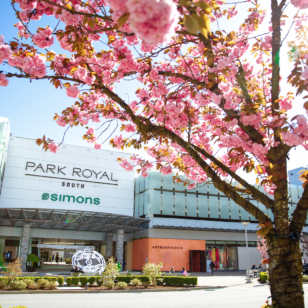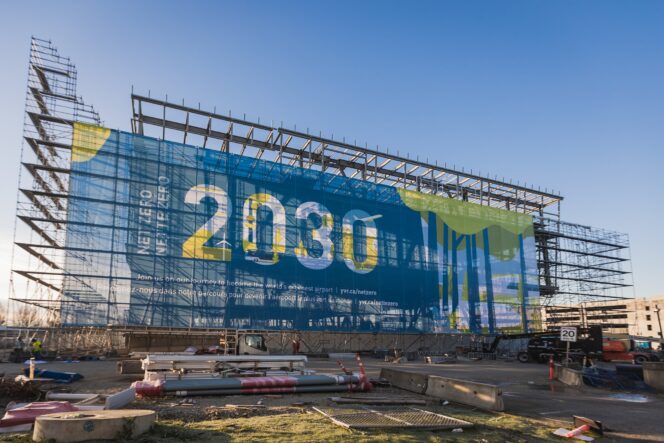
Sourced from YVR Airport
In October, YVR Airport released the details of their ambitious “Roadmap to Net Zero Carbon in 2030,” with their target date 20 years ahead of their original plan. Marion Town, Director of Environment at YVR, explains how the Airport has both the desire and the available expertise to speed up the changes necessary to reach the target.
Town says the pandemic caused many construction projects to be put on hold, creating an invaluable opportunity for YVR Airport to focus on other important initiatives, such as mitigating climate change. “Time and the availability of people worked to our advantage. And so, we utilized the time to look at what it would take to accelerate. And the truth is, in the end, it looked like it would cost us less if we moved it forward,” she says. She cites the Paris Agreement at the 21st Conference of the Parties (COP21) as an impetus for YVR to get in gear: “I think the absolutely necessity to take responsibility for our emissions and do whatever we could to move forward as rapidly as we could was an essential part of why we were accelerating.”
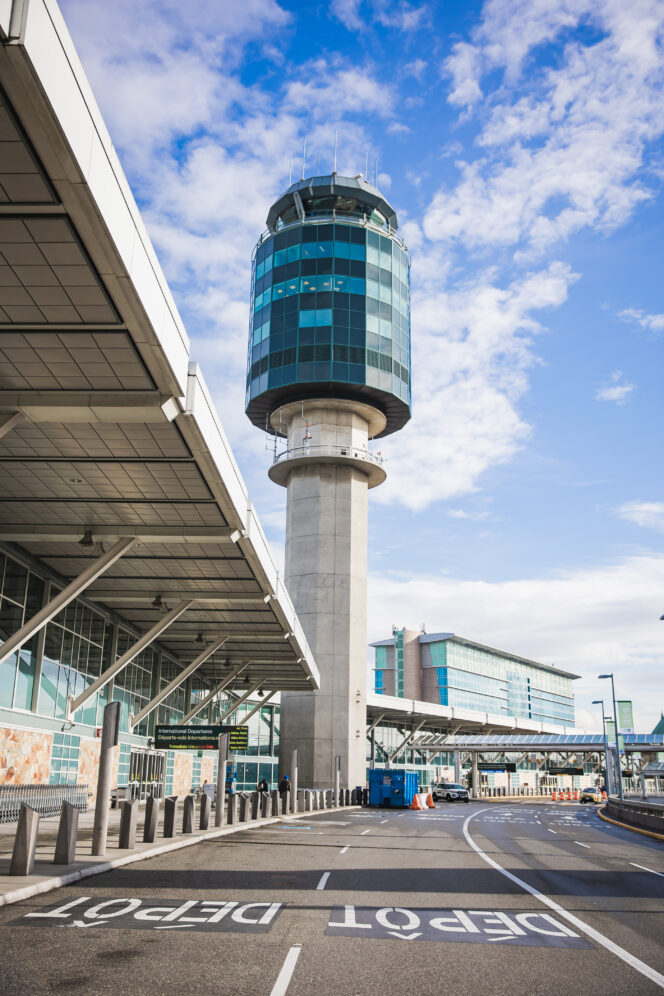
Sourced from YVR Airport
While YVR does not control airplane emissions, they have focused on what they have control over: the emissions and energy consumption from the operations and infrastructure of the Airport Authority. “Our road map to net zero means we have to look at everything that produces CO2 and then we have to figure out how we shrink it,” Town says. YVR adheres to greenhouse gas accounting protocols to measure their emissions footprint. Most of it comes from natural gas used for heating, as well as for cooking done by YVR’s food and beverage tenants. “Most of our GHG [greenhouse gas] footprint is associated with operating the biggest building in British Columbia,” says Town. She adds that emissions also come from their fleet of vehicles and use of electricity.
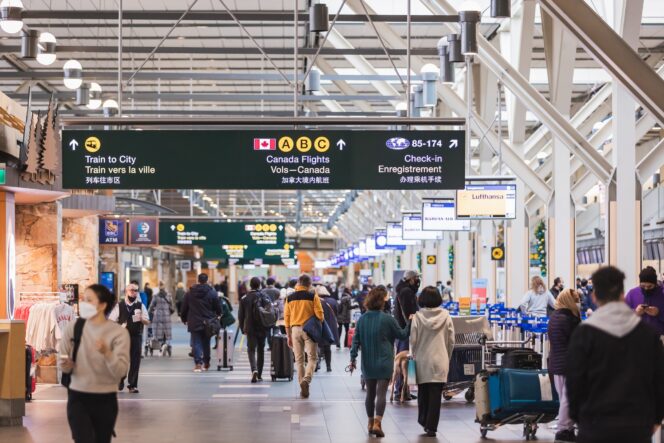
Sourced from YVR Airport
YVR has identified four decarbonization pathways to get them to their target. The first involves greening their fleets and equipment, either by making them electric or switching to green fuels, like renewable diesel. Secondly, YVR is rethinking energy use in its buildings. “The work we’re doing right now is investing in all of the ways we can reduce and make a more efficient use of energy in our terminal buildings,” Town says. YVR is working with partners BC Hydro and FortisBC to make their buildings as energy efficient as can be.
The third pathway involves replacing fossil fuels with alternatives, such as 100% green electricity. Town points out that YVR already has a solar water system, and that they’re hoping to expand their use of solar power. They’ll also supplement their green electricity and solar power with the switch to renewable fuels. “We’re looking to use renewable natural gas that’s been offered by Fortis to bring that natural gas footprint down to virtually zero,” she says.
After YVR has done everything they can to reduce their footprint, using the technology available to them, they anticipate having some emissions remaining. So, their final pathway, called “Closing the Gap,” involves purchasing carbon offsets and investing in carbon renewals. The assumption is that YVR will rely less and less on carbon offsets over time, and that they’ll shift to more proactive investments. Town says, “In the future, in order to be truly net zero, it means by 2030, we need to be doing carbon removals, and that’s actually investing in technologies taking carbon out of the atmosphere.”
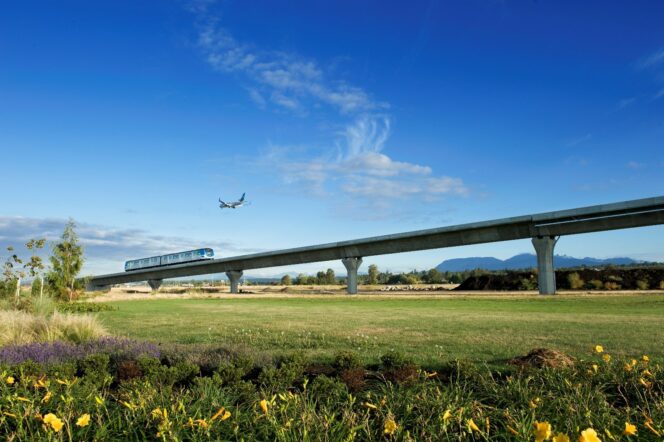
Sourced from YVR Airport
Town acknowledges the Roadmap is a huge undertaking with an extensive number of moving parts involved, but she is confident YVR can reach net zero carbon by 2030, especially given the enthusiasm of its partners. And these strong partnerships also come into play in supporting greater change throughout the industry.
“Air Canada has also made a commitment to being net zero. As you can imagine, decarbonizing aviation itself is an even bigger challenge, and we’ve been working with Air Canada and our other partners on how we can help them reduce their emissions,” Town says. For example, YVR provides electrical ground power that aircraft can plug into, so they can shut off their auxiliary power units and burn less fuel. Town is also involved in bringing sustainable aviation fuel into British Columbia.
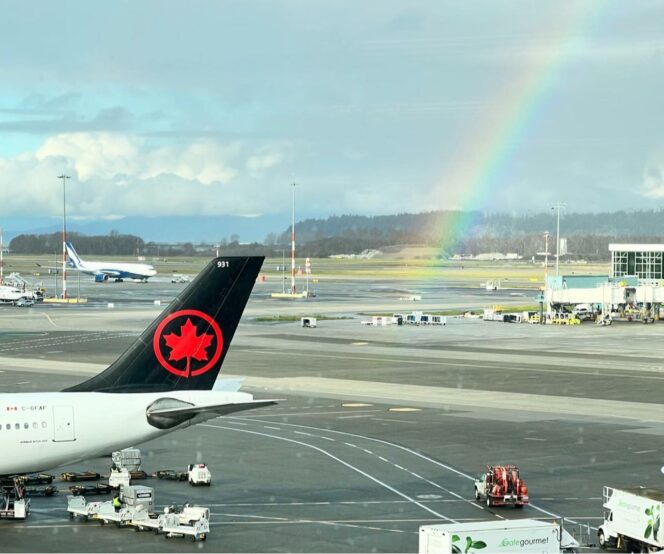
Sourced from YVR Airport
YVR is working with their contracted ground handlers to electrify their fleets. “We have one of the highest electric ground handling fleets in Canada. At least 50% of those ground handlers have electric pieces of equipment,” says Town.
As the first airport to make a net zero commitment by 2030, YVR is taking on a leadership role. “We really want to prove it can be done. That’s why we made all the details of how we’re going to decarbonize publicly available,” Town says. She adds, “It’s critically important for us to take a leadership role in proving how you do it, to share the lessons we learn along the way. And that will be the mistakes we make, as well as the successes that we have.”
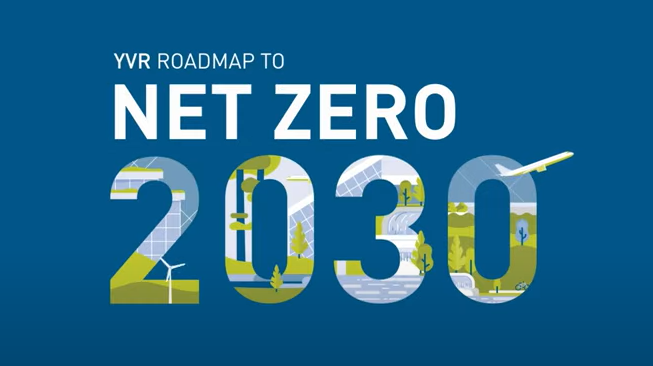
Sourced from YVR Airport
YVR’s belief in the importance of sustainability and reconciliation is evidenced by the signing of a 30-year Sustainability and Friendship Agreement (2017) with the Musqueam people. “We are stewards of this land, and we take responsibility for our operations, and we recognize the traditional ancestral and unceded territory that the Musqueam have here,” says Town. For instance, YVR is in the process of being re-certified as a salmon-safe airport, a process that has involved having a Musqueam representative assess their operations.
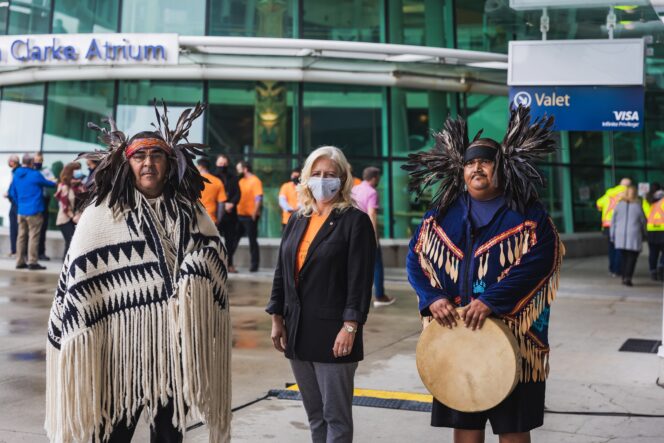
National Day for Truth and Reconciliation with Musqueam Chief Wayne Sparrow (left) in attendance; sourced from YVR Airport
“The most enlightened part of our journey has been the walk we’re taking with Musqueam,” Town says. YVR is working to honour its commitment to the past, present, and future of the land on which it is situated – and part of that commitment involves reducing the Airport’s emissions in order to achieve net zero carbon. “We live in a pretty spectacular part of the world, and we owe our community the right to be able to fly and travel in a way that is sustainable and green,” she says.
















